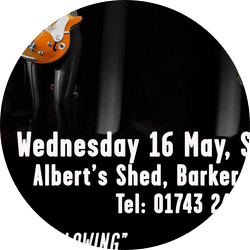Similar alternatives
Details
In the age of the TV talent show and the corporate pop cabal, Stephen Dale Petit is leading the resistance. He's a man on a mission, sworn to establish the blues as the dominant force in popular culture. He's a riot-starter and rabble-rouser, blowing out speakers with the thrusting hooligan anthems (Mojo) of his acclaimed studio work and igniting a new venue each night with his raw, fresh energy (The Times). He's a genre spokesman and bluesman savant, whose BLUnivErSity lectures reboot the old masters for the modern age, while rallying new recruits to the cause. No wonder that Guitar & Bass cited Petit as proof positive that the blues can move forward in the 21st century.
All the best bluesmen come with a backstory, and at 46, Petit has walked a winding path to the head of the modern scene. If his 1969 birth in California's Joshua Tree desert was prescient he was delivered by a passing doctor with a passion for the blues then the acquisition of a Gibson SG at the age of twelve confirmed his calling. The reason I'm on the planet is to play blues guitar, Petit told BBC News. I'm on a mission to spread the word about the blues and about the guitar especially to young music lovers.
Petit's own epiphany hit hard. Rewind to his adolescence in the early-'80s and his formative influences were growing daily, taking in the vintage US heavyweights (Robert Johnson, Elmore James, Son House) and the British upstarts (Cream, Zeppelin, Yardbirds). Soon, he began his own precocious march on the Californian club circuit, playing five nights a week, cutting heads with senior players, jamming with titans including B.B. and Albert King, and immersing himself in the genre's ethos. The blues is a beautiful thing out of the cesspool of human nastiness, Petit told Classic Rock. This music was forged in horrific conditions. It was really the wail of a soul of a subculture of society in America. As a teenager, I was scared by it but I couldn't escape the pull.
By the early-'90s, the bluesman's love of the British boomers had lured him to the epicentre London for a period whose dazzling highs were offset by desperate lows. Collaboration and friendship with musicians including Eric Clapton, Keith Richards, Mick Jones and David Gilmour should have been his springboard, yet as the drugs flowed, Petit floundered, losing his momentum to addiction and dangling his talent by a thread. It got to basically living on the street, he recalled. It was the blues that saved me. There was a moment when the choice was pretty clear: 'Am I just going to be a drug addict and is my passion going to be washed down the toilet?'
Following that moment of clarity, Petit clawed himself back from the brink, regaining his confidence as a performer by busking in the bearpit of the London Underground, and attracting both a grass-roots fanbase and a media profile. People started asking if they could buy the music they were hearing, and I didn't have anything, he says. So I set about recording Guitararama.
Guitararama proved to be the line in the sand. Originally self-financed and released in a limited pressing of 5,000 units, the buzz prompted a reissue in 2008 (with distribution from Universal) and pricked up the ears of media tastemakers. Suddenly, this former best-kept-secret was a regular guest on BBC Radio 2 (try 2011's The BBC Sessions for a collection of his appearances) and a fixture in the music press, who declared Petit's incendiary Firebird fretwork to occupy a stunning middle-ground between the fire of Freddie King, the instinct of Jimmy Page and the soul of Clapton (Classic Rock).
By 2010, The Crave upped the ante (included by Classic Rock in the Top 50 Albums Of The Year), while in 2013, the man in the hat raised the bar with Cracking The Code. Patently Petit's most ambitious release to date, the album was home to his most ferocious originals, from Get You Off to Riot City, bolstered by A-list guests including Dr John, Mick Taylor and Hubert Sumlin. Tracking his solos mere days before his death, Howlin' Wolf's iconic guitarist gave Petit a glowing endorsement, If a lot of people could play like you, shit, I'd sit back and smile, and the wider reaction was just as receptive, with Cracking The Code deemed rampant perfection by The Blues.
Somehow, throughout this dizzying rise, Petit stuck resolutely to his guns. In 2007, the bandleader began spreading the word though his famous BLUnivErSity lecture tours, speaking at the UK's universities and reeling uninitiated students into the genre with his charisma and insight. In 2010, he pulled together a crack squad of high-profile musicians, including Chris Barber, Ronnie Wood and Mick Taylor, in a successful bid to protect the iconic 100 Club (a venue that Petit dubs his spiritual home, having played there on more than twenty occasions).
That same year, Petit hit the High Voltage Festival in London for a decibel-limit-defying set that was bottled by the legendary Ronnie Lane Mobile Recording Unit. The resulting album Live At High Voltage was initially issued in 2012 in a vinyl-only, limited-edition run, before its near-mythical status sparked the 2014 digital reissue. This is hands down the greatest live record you'll ever hear, raved The Blues in a 10/10 review. Even The Who didn't quite reach the intensity of Petit and friends.
True to his word, this is a man on a mission. And in 2016, with Petit returning from double-headlining with blues-rock titan Walter Trout, there's no mistaking a man who means every line, every lick, every fleck of spittle and drop of sweat. I want to see the blues become mainstream, he says. I want to see it become common currency in the discourse of modern popular culture. I want to see it become blues city.

